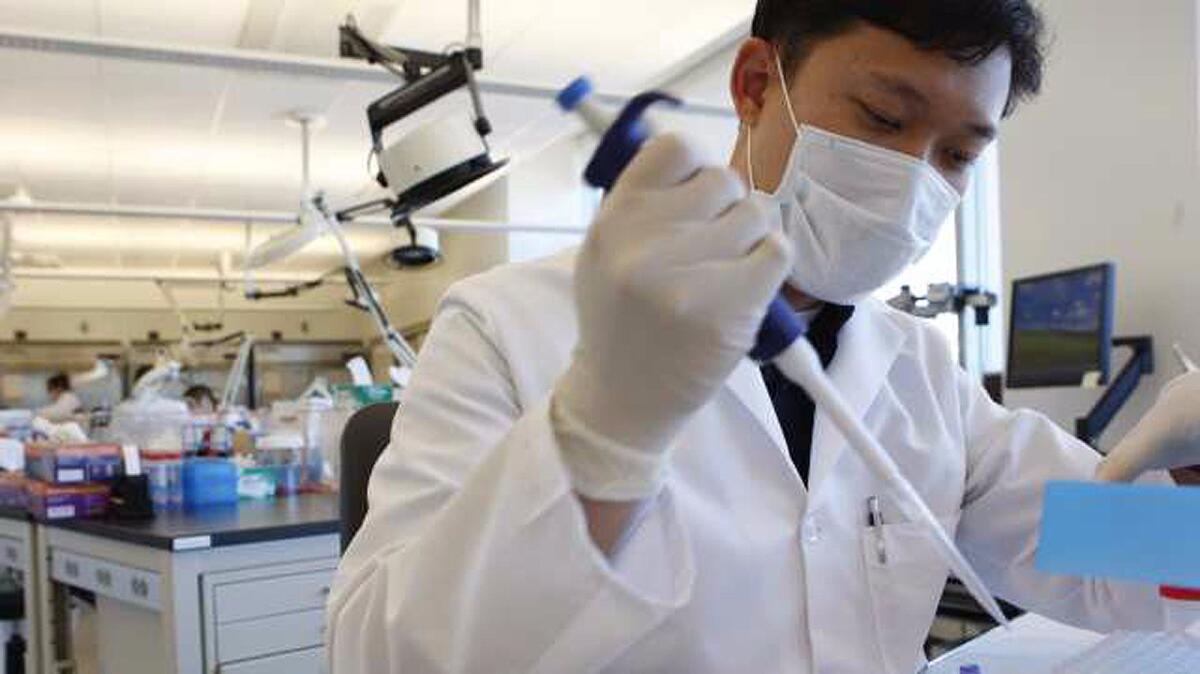Lawmakers try to fix a side effect of reducing drug and theft crimes: Not enough DNA samples for cold cases

California lawmakers are once again trying to expand the collection of DNA evidence in criminal cases, something they say has declined under Proposition 47, hurting cold rape and murder investigations.
The landmark ballot measure, which voters passed in 2014, reduced drug possession and some theft crimes to misdemeanors in a move to lower the jail and prison population across the state. But in doing so, law enforcement officials say, the list of felony cases from which police are required to gather DNA evidence has been narrowed, causing a drop in the state’s database of forensic samples.
Assemblyman Jim Cooper (D-Elk Grove) says he hopes to address that “unintended consequence” through the reintroduction of Assembly Bill 16, which would order investigators to gather swab samples, blood specimens, palm prints and fingerprints from offenders convicted of certain misdemeanors.
An identical iteration of the bill died last legislative session in the Senate Public Safety Committee amid opposition from privacy and civil rights advocates who found its provisions too far-reaching. But Cooper said it was a good proposal worth pitching again.
“What we want is to make sure that bad people who commit serious crimes are held accountable,” he said.
AB 16 would apply to misdemeanors that were considered felonies when voters in November 2004 passed Proposition 69, which required authorities to collect DNA evidence from all felons. It also would apply to some drug and theft offenses that before the passage of Proposition 47 were known as “wobblers,” or crimes that could be charged as misdemeanors or felonies depending on their severity.
Supporters of the legislation say collection of forensic evidence in these types of cases is crucial to investigations that have gone cold, in which officers have few leads to follow. They point to at least half a dozen studies in other cities and states that show assailants in old murder, rape and assault cases are often arrested years later for unrelated, lower offenses.
In 2010, the California attorney general’s office found that 61% of the DNA samples that were entered into the state’s databank and resulted in matches to suspects in cold cases had been collected in nonviolent, lower-level felony crimes, such as drug offenses, fraud or other property crimes.
Among those cases was that of 20-year-old Joshua Graham Packer, who was arrested on robbery charges and connected to an unsolved triple murder in Ventura County from 2009.
But opponents argue AB 16 would expand the forensic database far beyond the scope of any other state law, requiring the intrusive collection of DNA evidence in minor crimes such as drug possession and shoplifting.
Mica Doctoroff, a legislative advocate with the American Civil Liberties Union of California Center for Advocacy and Policy, said her organization had not yet taken a position on the bill. But she said the ACLU had opposed its predecessor due to the rising concerns with DNA evidence itself.
Once considered “the gold standard” of forensic science, DNA analysis has faced greater scrutiny in the courtroom as the methods to interpret results continue to evolve. Expanding the state’s database, Doctoroff said, could increase the likelihood of repeating past mistakes, raise serious privacy concerns and disproportionately target blacks and Latinos.
“We know that people of color are stopped, searched and arrested at a much higher rate in California,” she said. “With this type of expansion, you end up with an over-representation of sensitive information from people of color.”
Twitter: @jazmineulloa
ALSO:
Movement builds to correct major flaw in Prop. 47
Shelved DNA bill had personal meaning for Los Angeles Assemblyman Mike Gatto
The promise and perils of DNA evidence
Updates on California politics
More to Read
Get the L.A. Times Politics newsletter
Deeply reported insights into legislation, politics and policy from Sacramento, Washington and beyond. In your inbox three times per week.
You may occasionally receive promotional content from the Los Angeles Times.







